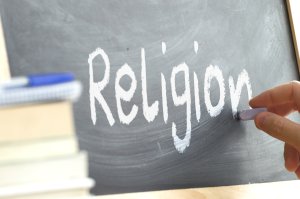Religious Education is outdated, unpopular and opens the door to proselytising.
There are many more subjects children and young people need to learn.
It's time to replace RE with something more appropriate for 21st century students.
It is important for children and young people to learn about different religions and beliefs. But we don't think our schools need a dedicated subject to do this – especially a subject as out-of-date and as irrelevant as Religious Education (RE).
Surveys consistently show RE is one of the least popular school subjects, an indication of its increasing irrelevance.
58% of British adults think religious studies is unimportant at secondary schools. And a quarter of England's secondary schools do not offer RE.
Unlike any other compulsory subject, RE is determined at a local level in England. In each local authority the agreed syllabus for RE is determined by committees representing the Church of England and other religion and belief groups, as well as the local authority and teacher's groups.
As a result, schools not only face a local lottery regarding what their RE syllabus will contain; they will have to teach a subject under significant control from religious interest groups. These groups are strongly motivated to ensure their religion is represented in an overwhelmingly positive light. The current arrangements mean the subject lacks objectivity.
Many faith schools don't even need to follow the locally agreed syllabus and can instead teach religion from their own exclusive viewpoint.
A new nationally-determined civics and citizenship subject could encompass teaching about religious and nonreligious worldviews and allow students to consider moral and ethical issues. Religion and belief could also be explored in other relevant areas of the curriculum.
In Wales, RE has recently been replaced with Religions, Values and Ethics (RVE). While we welcome this broader and more inclusive subject, problems remain regarding the influence of religious groups and exceptions allowing faith schools to teach confessional RE.
We need a reformed subject to ensure education about religion and belief is broad, balanced and proportionate.
We've created a series of resources – Exploring Secularism – for anyone wishing to explore issues of religion, belief, ethics, and worldviews in schools. The resources aim to provide teachers with the material they need to engage with secularism in an informed way.
As British society considers how to respond to greater religious diversity and growing irreligiosity, it is become increasingly important for children and young people to develop their understanding of the interaction between religion, society, and politics. The study of secularism explores this interaction, together with questions about how we balance freedom of, and from, religion with other rights.
Take action!
1. Write to your MP
Support our campaign to ensure every pupil has the same entitlement to high quality, non-partisan education about religious and non-religious worldviews.
2. Share your story
Tell us why you support this campaign, and how you are personally affected by the issue. You can also let us know if you would like assistance with a particular issue.
3. Join us
Become a member of the National Secular Society today! Together, we can separate religion and state for greater freedom and fairness.
Latest updates
Most Brits don’t think secondary school RE is important, poll finds
Posted: Thu, 20 Oct 2022 13:56
Over half of British adults do not think it is important for religious education to be taught in secondary schools.
Almost three-fifths (58%) of British adults said religious studies is "not very important" (31%) or "not at all important (27%) in secondary education, in response to a YouGov poll in October.
The findings come in the wake of RE Policy Unit analysis earlier this year which showed 34% of academies do not include RE on the school timetable. Furthermore, 500 secondary schools are teaching zero hours of dedicated RE in Year 11.
Previous polling found out of a list of 18 subjects, respondents ranked religious studies 15th in terms of being important (40%), with only drama, classics and Latin being positioned lower.
Criticism of RE in England
The National Secular Society has consistently warned RE is out of date and often fails to be broad, balanced and inclusive.
Current legislation dates back to 1944 and requires schools with a religious character to teach RE in accordance with the beliefs of the religion or denomination of the school.
RE is the only compulsory subject that is locally determined and is largely controlled by religious interest groups even in nonreligious schools. Representatives of non-religious worldviews are often excluded or denied voting rights on RE committees.
In Wales, RE has been renamed 'religion, values and ethics' and must teach religious and non-religious worldviews equally.
NSS: RE "outdated and unpopular"
NSS chief executive Stephen Evans said: "The time has come to move away from religious education being a mandatory school subject under the influence of religious authorities.
"Schools have an important role to play developing young people's critical thinking and understanding of religious diversity. There are much better ways to achieve this than through the outdated and unpopular model of religious education."
"Existing curriculum requirements, especially citizenship education, should be enhanced to promote an understanding of society's diverse religious and non-religious landscape whilst at the same time preparing pupils to consider and understand their future rights and obligations as citizens."
Hat-tip: Clive Field, Counting Religion in Britain, October 2022.
Pupils at failing Catholic school 'do not learn about other faiths'
Posted: Wed, 13 Jul 2022 13:28
A state-funded Catholic school has been criticised by inspectors for failing to teach pupils about other religions.
According to an Ofsted report published this month, pupils at Our Lady Immaculate Catholic Primary School in Wigan "do not learn about faiths or cultures other than their own".
They are therefore "not well prepared to live in a diverse society".
The school was rated 'inadequate' by Ofsted for this and other failings, including its "poor" curriculum and high numbers of "vulnerable" pupils who do not attend school regularly.
Our Lady Immaculate is a voluntary aided school, which means it can teach religious education (RE) from its own exclusive viewpoint.
Its RE curriculum is delivered through the 'Come and See' scheme of work based on Catholic theology.
NSS: Faith schools "ill-suited" to 21st century education
National Secular Society head of campaigns Megan Manson said: "It is not surprising that faith schools permitted to teach RE from their own exclusive viewpoint fail to prepare children for living in a diverse society.
"This case demonstrates the inherent conflict between ensuring all children are taught about different faiths and cultures, and faith schools' desires to inculcate children with their particular religion.
"This intractable issue shows how ill-suited faith schools are to the educational needs of children in the 21st century."
Failings at independent faith schools
Other Ofsted reports published this month revealed a number of independent faith schools have also failed to meet standards:
- Ofsted conducted an unannounced monitoring visit to the Institute of Islamic Education in Dewsbury prompted by complaints about sexual abuse, safety and quality of care. The inspection found leaders failed to properly address a "serious allegation" of peer-on-peer sexual abuse and an assault on a pupil by other children. Similar concerns were raised last year.
- Wiznitz Cheder School, a Jewish school in London, gives "too little time" to secular subjects. Despite developing a plan to teach about different religions and cultures and different types of families, it has not ensured that these plans are applied effectively in the classroom.
- Pupils at Talmud Torah Yetev Lev, another Jewish school in London, continue to have a "limited understanding" of other faiths and cultures despite repeated concerns raised. The school has also failed to meet safeguarding standards.





